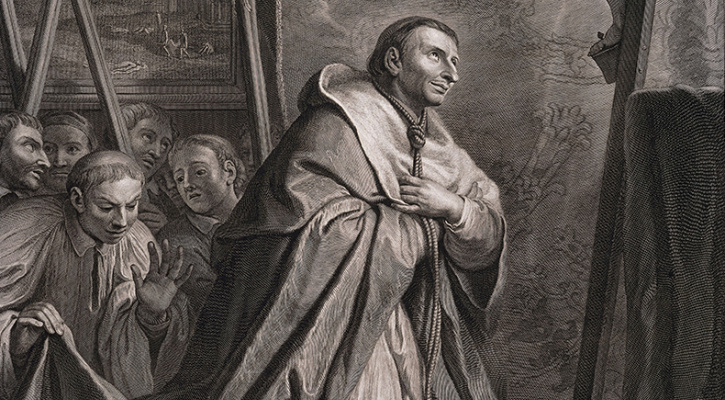San Carlo Borromeo, Saint of the day for November 4th

Saint of the day for November 4
(2 October 1538 - 3 November 1584)
Audio file
History of San Carlo Borromeo
The name of Carlo Borromeo is associated with the reform. He lived during the period of the Protestant Reformation and contributed to the reform of the entire Church during the last years of the Council of Trent.
Although he belonged to the Milanese nobility and was related to the powerful Medici family, Carlo wished to devote himself to the Church. In 1559, when his uncle, Cardinal de Medici was elected Pope Pius IV, he appointed him cardinal deacon and administrator of the archdiocese of Milan. At the time Charles was still a layman and a young student. Because of his intellectual qualities, Charles was entrusted with several important positions related to the Vatican, and later appointed secretary of state with responsibility for the papal state. The premature death of his elder brother led Charles to a final decision to be ordained a priest, despite the insistence of his relatives that he marry. Immediately after being ordained a priest at the age of 25, Borromeo was consecrated bishop of Milan.
Working behind the scenes, San Carlo deserves the merit of having held the Council of Trent in session when at various points he was about to dissolve. Borromeo encouraged the pope to renew the council in 1562, after it had been suspended for 10 years. He took charge of the entire correspondence during the final round. Due to his work on the Council, Borromeo could not take up residence in Milan until the conclusion of the Council.
Eventually, Borromeo was allowed to devote his time to the Archdiocese of Milan, where the religious and moral picture was far from brilliant. The reform needed in every phase of Catholic life among both the clergy and the laity was initiated in a provincial council of all bishops under him. Specific norms were drawn up for the bishops and other ecclesiastics: if the people were converted to a better life, Borromeo had to be the first to set a good example and renew his apostolic spirit.
Charles took the lead in setting a good example. He devoted most of his income to charity, forbade all luxuries and imposed severe penances on himself. He sacrificed wealth, high honors, esteem and influence to become poor. During the plague and famine of 1576, Borromeo tried to feed 60.000 to 70.000 people a day. To do this, he borrowed large sums of money that took years to repay. While the civil authorities fled at the height of the plague, he remained in the city, where he cared for the sick and dying, helping the needy.
The work and heavy burdens of his high office began to affect Archbishop Borromeo's health, leading to his death at the age of 46.
Reflection
Saint Charles Borromeo made Christ's words his own: "... I was hungry and you gave me to eat, I was thirsty and you gave me to drink, stranger and you welcomed me, naked and you clothed me, sick and you took care of me, in prison and you visited me ”(Matthew 25: 35-36). Borromeo saw Christ in his neighbor, and he knew that charity made for the last of his flock was charity made for Christ.